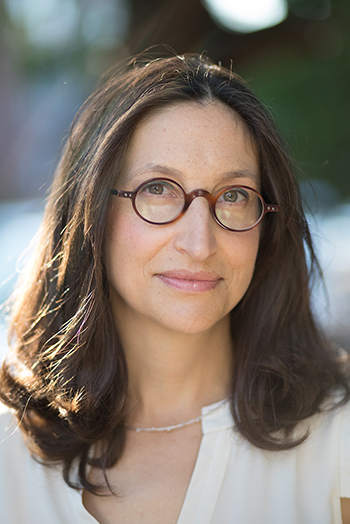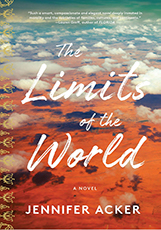
Acker majored in anthropology. The competition
between faith and belief is the central question
of her novel.
Ever since human beings first thought to ask themselves the question “How ought we behave?,” two different structures have endeavored to o er a set of answers, occasionally aligned but more often opposed: philosophy and religion. These competing domains of the mind and the soul are well-represented in The Limits of the World, a layered, sophisticated debut novel by Jennifer Acker ’00.
Sunil Chandaria, a graduate student in philosophy working toward his Ph.D. at Harvard, receives two pieces of startling news from his mother, Urmila, and father, Premchand, practicing Jains who live in Ohio: his cousin Bimal has been in a bad car accident, and, while we’re at it, is actually not his cousin but in fact his brother, long ago left behind with family in Kenya. The Chandarias have immigrated to America from Nairobi, where the rest of their family has lived for several generations, and it’s imperative, Sunil is told, that they return there to be with Bimal while he recovers.
Sunil is concerned, rightly, that Urmila (who could be described as strong-willed, stubborn, opinionated or generally exasperating) might eat his girlfriend Amy alive in Nairobi, but he insists that Amy accompany him regardless. “What’s this, your girlfriend is not family,” Urmila tells him on the phone. “This is serious!” As a counter, he lies and tells his mother that actually, he and Amy have been married, so she’d better get used to it. Later, before getting on the plane to Nairobi, they actually go through with it.
In Kenya, characters are kettled into small spaces like kitchens, hospital rooms and safari tents, where they are forced to reckon with the various ways they have mistreated and lied to one another, and abused the commitments attendant to their relationships. Interstitial sections, presented as transcripts of audiotapes recorded by a Chandaria elder to preserve the family’s history, summarize the fascinating and little-known story of South Asian laborers shipped by the British from one corner of the Empire to another in order to work on the railroads. (“There are Indians in Africa?” an Indian-American character asks Sunil at one point.)
The well-paced plot, rather than a mere scaffold, is knotted and compelling.
All the while, Sunil is pondering his long-overdue dissertation, which reckons with an evolutionary framework for morality. Later, another sudden tragedy threatens to sever already strained family ties.

The Limits Of the World
By Jennifer Acker ’00
Delphinium
The well-paced plot, rather than a mere scaffold for the “big ideas” that Acker skillfully puts into play, is wonderfully knotted and compelling; the frustrations that we feel with the Chandarias’ various failures to communicate effectively, Urmila’s in particular, may indeed be heightened by familiarity from our own families. “Urmila,” Acker writes, “did not understand how love was not a given, how it constantly needed to be rea rmed. Why did she need to apologize when it was so obvious that her grief had gotten the best of her? Of course she loved her son!”
Perhaps most impressive, though, is the way that Acker is able to in inflect this high-voltage plot through Sunil’s struggles with the life of the mind. At one point, Sunil has the realization (clear to the reader for some time) that for all his intellection, he still might not be a moral person. As Acker writes, “Sunil knew he used moral reasoning as a weapon ... against his mother. ... The thought made him ill and ashamed. How could he move forward with his work, knowing its capacity to undermine a sustaining pillar of his life? If he were a religious man, what he faced would be a crisis of faith ... instead he had a crisis of belief: if there is no way of knowing moral truths, how do you have faith in the rightness or wrongness of your actions?”
This competition between faith and belief is the central question of the novel, and one that gives it real heft. What makes this novel a novel, however, rather than a philosophy paper, is the way in which that question is layered over other questions about marriage, family legacy, the challenges of migration and how we ought to behave with those we love. This is an immensely rewarding first novel, with lessons for both the heart and the mind.
Mancusi is the author of A Philosophy of Ruin (Hanover Press, 2019), his debut novel.
Photo: Zoe Fisher